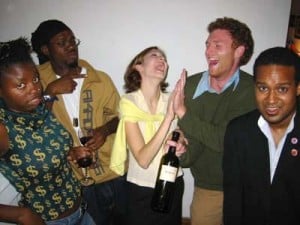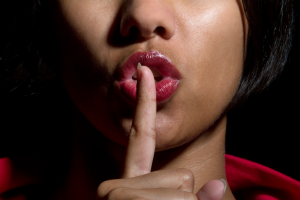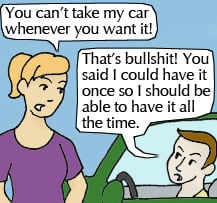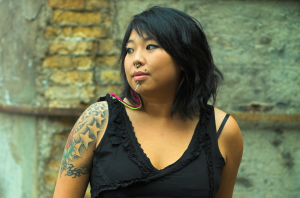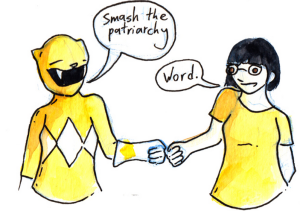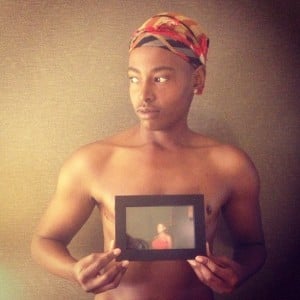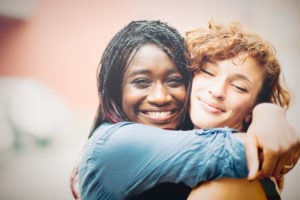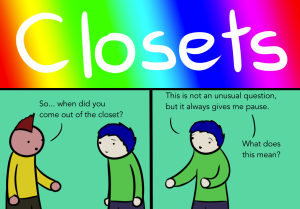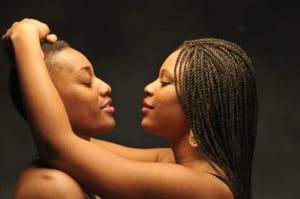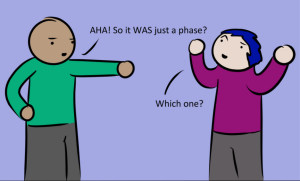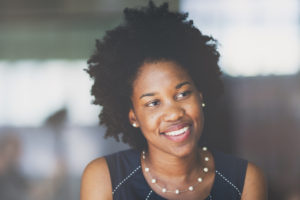
A young adult looks off to the side, smiling.
September 23 is Bisexual Visibility Day – and it’s a damn good reason to celebrate!
As a queer bisexual woman, I love an opportunity to celebrate my identity and wonderful bi+ community. But recognizing that a day like this is necessary also puts a little sadness in the back of my mind.
We need Bi Visibility Day because throughout the rest of the year, society’s norms make sure we remember that visibility is not something we can expect on the regular.
We’re often left out of the media, erased from historical narratives, and even excluded from LGBTQIA+ events and organizations that forget their acronyms include more than an L and a G.
Even if you’re not bisexual, or your sexual attractions don’t include more than one gender, you can help support bisexual visibility.
And oftentimes, it’s not hard to do. The most basic ask is simple – we want to be acknowledged as existing. So sometimes, all it takes is a simple change in language to recognize that not everyone’s attracted to only one gender.
True, there are other times when it gets a little more complicated. Like every new act of inclusion, some people resist bisexual visibility on the basis that it’s too hard: “You’re either gay or straight – I can’t keep up with anything more than that.”
But it’d be really nice for people to at least make an effort to recognize that we exist.
Okay, that’s a bit of an understatement. It can actually be transformative, life-changing, and even life-saving to affirm bisexual identities.
Do you know what happens when bisexuality gets erased? Bisexual youth grow up feeling deeply ashamed of themselves, and bisexual adults live with high rates of poverty and homelessness.
The lack of supportive health professionals hurts on our mental and physical health. We also deal with high rates of intimate partner violence and sexual violence, and people use biphobic stereotypes to judge us as survivors when we do.
Can you really change all of this with small adjustments to your language?
Well, you’re not going to single-handedly solve all of the problems with society’s biphobia. But if you have bisexual friends, family, or other people in your community, you could make a difference for someone who could really use your help.
So here are some tips.
Many of these apply to anyone who identifies as bisexual, pansexual, sexually fluid, or any other orientation that includes attraction to more than one gender. I don’t want to make assumptions by applying it all to people whose identities are different from mine, but I’ll also use the terms bi+ and polysexual to refer to the umbrella of orientations that include attraction to more than one gender.
Keep these tips in mind, and you can have an effective role in helping bi+ people fight invisibility and erasure.
1. Follow Their Lead
Before I go telling you to help your friends’ visibility by shouting their identities from the rooftops, I’ve got to cover the importance of listening to what they need from you.
Everyone who shares an identity has a unique relationship to their identity – which means that support is different for everyone.
If your friend is out to you but not to the general public, then supporting them might only include private conversations. Don’t out them to others if they’re not comfortable with that.
But on the other side of that coin, I’ve had people automatically treat my bisexuality like I’m letting them in on a scandalous secret. I’m open about who I am – you don’t have to whisper!
To really find out how best to support your bi+ friends, the best thing to do is ask.
2. Give Them Space to Be Honest About Who They Are
It can seem like you’re accepting people by insisting that they’re not “different,” but “just like you.” Surface-level efforts to make social change teach us that we can achieve “equality” by treating everyone the same.
But acceptance has to go deeper than that – don’t expect your bi+ friends to be just like you in order to have your respect.
For instance, I’ve hung out with straight women who know I’m queer, but only asked about men I find attractive. I didn’t know if I could mention an attractive person of another gender without being judged.
The pressure to assimilate into LGBTQIA+ spaces can be just as bad – I don’t want to feel like I’ll be accepted only as long as I stick to talking about my attraction to women because they share my gender.
And getting stuck between these two situations reveals a glaring omission – unless I’m in an intentionally genderqueer inclusive community, there’s no space to include non-binary folks who are in relationships with bisexual people or who are bisexual people. The expectation is that everyone is a man or a woman who’s attracted only to men or to women.
But many people’s lives don’t fit those narrow parameters. As bi+ people, your friends’ experiences might be different from yours – and that’s okay.
3. If They’re Dating, Help Them Affirm That They’re Still Bisexual
It’s not as supportive as you might think to wait for your bi+ friends to “pick a side.”
One of the most persistent stereotypes about bisexual people is that we’re just “confused” and “experimenting” until we figure things out.
But if a bisexual friend gets into a relationship, that’s not your cue to erase their identity in celebration by declaring that they’re now gay or straight.
Some people do experience changes in their sexual orientation over time, and that’s perfectly valid. But only your friend can determine that – it’s not up to you.
It’s exasperatingly common for people to assume that we’ll get over the “phase” of bisexuality. I don’t need the pressure to give reminders or “proof” that, yes, I’m still bisexual, regardless of who I’m dating.
You can interrupt this hurtful pattern simply by continuing to acknowledge your friend’s identity. And for that matter, don’t assume anyone’s identity based on who they’re dating.
Instead of “David’s dating a man now – I didn’t know he was gay,” try “David’s dating a man now – I didn’t know he was attracted to men.”
Sometimes, all it takes to prevent bi+ erasure is awareness that someone’s not necessarily attracted only to people of their partner’s gender.
Remember that gender and sexuality are much more of a spectrum than our common language leaves room for. A person you perceive as a man may not be a man, and a person you perceive to be in a “gay” or “straight” relationship may not be gay or straight.
4. Respect How They Define Their Sexuality
“You’re not bisexual – you’re just afraid to admit you’re gay.”
“You’re not bisexual – you’re pansexual!”
“You’re not bisexual – you’re confused.”
Have you ever thought or said a comment like these? They all have one thing in common – you assume you know a bi+ person’s sexuality better than they do.
But even if someone is still figuring their sexuality out, they know more about themselves than you do – and you’re not helping by erasing the way they identify themselves.
I’m telling you that I’m bisexual, and that to me, it means I’m attracted to people who share my gender and people of different genders, regardless of who I’m dating.
And my sexuality isn’t “half gay, half straight” – it is its own identity, and a metric based on attraction to men and women erases people of other genders.
If you ever feel like something’s not quite right with the way someone defines their polysexual identity, don’t assume that they’re the one who’s confused. You’re probably operating on some outdated assumptions, so ask questions or seek out more info to clear up your own confusion.
5. Look Out for Bi Erasure in the Media – and Don’t Follow Suit
Say you and I are watching a TV show. The leading woman has been portrayed as straight, but suddenly there’s a twist – she makes out with another woman.
You may see a character who has just come out as a lesbian – but I see the rare hope for a visibly bisexual character on TV.
Have you noticed how often the media erases bisexuality?
It’s common for most characters to be straight, and if not straight, then gay. If a character is attracted to more than one gender, they often avoid using “labels” or saying the word “bisexual” at all.
I can’t even tell you how grateful I’d be for a positive media representation of a Black bisexual woman like me – if you’ve got recommendations, please send them my way.
Because constant erasure sends a hurtful message to viewers like me – that anyone who’s not gay or straight has something to be ashamed of, or that they don’t exist at all.
Alone, you may not be able to do much to change this unfortunate trend. But instead of following the media’s lead and leaving bisexuality out of the conversation, let your bi+ friends know you’re there for them by validating their frustration.
6. Support Bisexual Organizations If You Can
So you can’t solve bi erasure all on your own – but you can support activists and groups who are organizing to address these issues as we speak.
There are international efforts to correct offensive and inaccurate definitions of bisexuality, to increase bisexual visibility in the media, and to track and address important issues like poverty, suicide, violence, and healthcare for bisexual people.
But very little of the funding that goes to LGBTQIA+ organization goes specifically to support bisexual and other polysexual people.
You may not think this is a big deal – after all, the “B” is part of the acronym, so anyone supporting queer and trans issues is supporting bi+ people, right?
Not quite. Lots of the most visible and most influential LGBTQIA+ organizations still operate as if only cisgender gay and lesbian people exist. That means bi+ people often can’t get the support we need from mainstream (usually heteronormative) organizations or from LGBTQIA+ organizations.
So find out how to support bi-specific organizations through social media, donations, or by helping spread the word for the need for these services.
If you’re connected with local LGBTQIA+ groups, help make sure they’re addressing the needs of those of us who aren’t cisgender gay men or women.
7. Give Space for the ‘B’ in LGBTQIA+ Events
You have even more power to build bi+ visibility if you’re in a position of leadership in your community.
And leadership can come in many forms – whether you’re organizing an event yourself or playing a supporting role, you might have a chance to speak up for bi+ visibility.
For example, if you’re leading a queer-focused event, it makes sense to be clear that it’s not a space for straight allies. But are you operating on assumptions about gender and sexuality to do that?
You might read two people as a straight couple, but you can’t actually tell just by looking what their gender or sexual identity is.
And if you’re leading an event that claims to be LGBTQIA+-inclusive, but you say, “everyone’s welcome, whether you’re gay or straight,” you’re making those of us who aren’t gay or straight feel unwelcome.
If your event is a celebration of LGBTQIA+ communities, include some bi+ leaders, heroes, and history! Learning about Brenda Howard, the “Mother of Pride,” is a good place to start.
You can also help a friend as a support buddy in spaces that might feel difficult, so they don’t have to go it alone.
It’s nice to know that if bi erasure happens, I’ll have someone else who’s willing to point it out – or at the very least, to squeeze my hand in solidarity when I feel isolated.
8. Think Intersectionally
Identities like your gender, your race, your disabilities, and your class can influence how other people treat you and how you understand your sense of self.
So being considerate of your friends’ bi+ identities is really a matter of thinking intersectionally – acknowledging that their identity comes with a certain set of circumstances in our society.
Here’s an example of an intersectional approach: You recognize that a bi+ friend’s identities can have an impact on their dating life.
And no, I don’t mean making that old joke that bisexuality gives them “more partners to choose from.”
I mean recognizing that a bisexual Latina might be fetishized and objectified more often than she’s approached respectfully. Or that a bisexual man who’s not thin might be fat-shamed in his queer community. Or that a bisexual non-binary person might struggle to find a dating website that doesn’t require them to check a box to define themselves as a man or a woman.
I might have giggled at that “more partners to choose from” line at one point (before I realized I’d be hearing it about five times a week for the rest of my life). But it can sting a little as a reminder that so many people only want to objectify me or steer clear of me because of who I am.
No single experience defines all polysexual people’s lives. When you think intersectionally, you can honor us as individuals whose lives are shaped by unique experiences.
9. Give Them Respect Without Respectability Politics
An unfortunate pattern that can come up even within bi+ communities is holding polysexual folks to oppressive standards in order to “earn” respect.
For example, this can look like challenging the stereotype of the promiscuous bisexual by saying, “Bisexual people can have normal, monogamous relationships just like everyone else!”
I get that this is intended as a positive message. But you’re putting down everyone who doesn’t have a monogamous relationship – and non-monogamous people deserve respect, too!
So instead of only supporting visibility for bi+ people who might be deemed “respectable” by the rest of society, support dropping these standards of respectability altogether. Help us fight for the right to really be ourselves instead of fitting someone else’s idea of who we should be.
10. Believe Them When They Tell You Something Hurts
As bi+ people, our experiences are often dismissed – which is one of the biggest reasons that so many of us feel invisible.
We tell you that questions about our sex lives are invasive, and you might say, “Don’t take it personally – I’m just curious!”
We tell you how we feel excluded from queer spaces, and you might say, “But gay people can’t be hurtful – we’re oppressed, too.”
When we go through so many painful experiences, and then we’re told that our identities and struggles are invalid, the impact really adds up.
So we could use your support in healing. A great start is simply to take our word for it when we tell you we’re hurting. Your trust can help your friends feel more recognition than the rest of society ever offers.
***
While reading this, you might have realized that some of your own behavior has contributed to erasure and invisibility of bi+ identities – and that you could’ve hurt someone in the past.
Our society operates on a lot of assumptions about how sexuality works, so just by following norms that say everyone’s either gay or straight, you might forget your friends who are attracted to more than one gender.
Bi+ visibility matters. It matters for the bisexual youth who think about suicide at alarming rates, for the sexually fluid adults who think they’re not worthy of love, for the pansexual people who are told they don’t exist, and more.
The good news? Making a positive difference can be as simple as changing your language, or asking a friend how you can support them.
We’re not alone in this world – and a reminder that you’re here for us can go a long way.
[do_widget id=’text-101′]
Maisha Z. Johnson is the Digital Content Associate and Staff Writer of Everyday Feminism. You can find her writing at the intersections and shamelessly indulging in her obsession with pop culture around the web. Maisha’s past work includes Community United Against Violence (CUAV), the nation’s oldest LGBTQ anti-violence organization, and Fired Up!, a program of California Coalition for Women Prisoners. Through her own project, Inkblot Arts, Maisha taps into the creative arts and digital media to amplify the voices of those often silenced. Like her on Facebook or follow her on Twitter @mzjwords.
Search our 3000+ articles!
Read our articles about:
Our online racial justice training
Used by hundreds of universities, non-profits, and businesses.
Click to learn more





